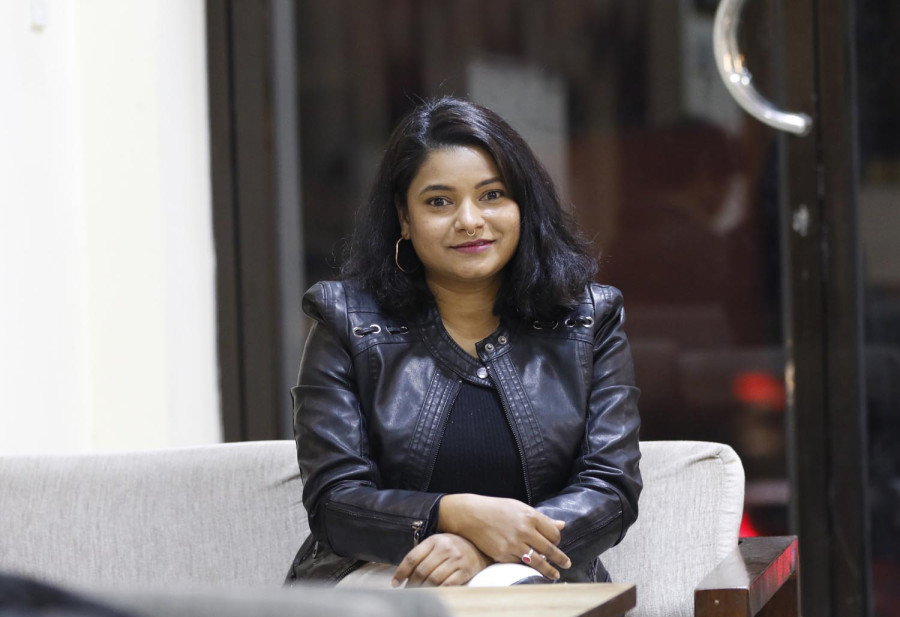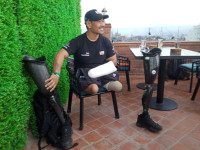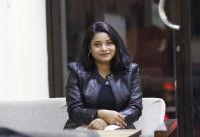Spotlight
She dreamt about singing but is now expressing herself through theatre
Renuka Karki Dholi has been making waves in the Nepali theatre scene.
Bishesh Dhaubhadel
Renuka Karki Dholi has been working in the Nepali theatre industry for the last 10 years, but she is better known for her performances in Sano Machha Thulo Machha and Women Of World’s Tabletop Stories (2021), which were staged recently.
Karki’s theatre journey in art started from her desire to become a singer. Having taken up a lucrative deal to train at the Shilpee Theatre, Karki honed her ability to sing and act.
Theatre - where the art of live storytelling with vivid expressions of emotions is put into practice that moves the audiences, is still a growing industry in Nepal and its outreach is only growing with wider audiences. The history of theatre — ranging from street performances to stage acts — has extended over the last several decades.
The stepping stones to Karki’s acting career came from street performances in her birthplace. Karki was recruited to perform at the Gurukul Theater Festival in Kathmandu by a member of Adac, an NGO specialising in environment and drugs that ran street theatre workshops in Dharan, after he saw one of her performances.
"Originally I had set out to be a singer. But I unexpectedly found the opportunity to act at the Gurukul Festival without ever having seen a drama. After that, I acted there for 4 years ".
Since then, Karki has had countless performances and has even diverged into directing and teaching the art.
What draws Karki towards performing theatre in front of a live audience is the focus of it all — being zoned-in; feeling the floor, music, and lights and the works - they all contribute to enhance her performance. When the audience is blacked out with dimly lit stages, there is no alternative but to keep your eyes glued to the actors and their performances. Who does what, looks where, makes what face; each detail contributes to understanding the act and truly indulging yourself in and being a part of it. Viewers cannot afford to miss a single beat because, unlike a movie screen, there is going back. For Karki, the undivided attention of viewers towards what she is doing on stage is a driving force for her to continue acting.
Not to forget that there is enough diversity in the art itself to keep a performer engaged in learning alone. Theatre can be further explored with dynamic body movements, little or no use of sound or narration, and even entirely improvised acts. Physical theatre and playback theatre are two such devices of the art.
As the name suggests, physical theatre focuses primarily on getting a story across with the use of physical movement — something Karki learned a great deal about at the Shilpee Theater years ago, but had not found the opportunity to use the craft.
Perhaps less obvious is playback theatre which is a genre of theatrical performance built upon audience’s input and massive improvisation at the performers’ end. Audience members tell stories from their lives and watch as the performers enact them on the spot. Karki taught playback theatre through Pro Public, an NGO in Kathmandu and in other six districts.
In performing via any of these methods, the central idea of coming up with the performance stays the same: there is no power dynamic in the team, everyone stands on an equal footing as the creators of an act built to engulf the audience through an expression of their own.
When asked about her likes and dislikes about theatre, Karki elaborated on her likings of the equality behind the scenes. She says "my gender or ethnicity hasn’t held me back from reaching my potential, it has rather helped me sometime". The same may not be said for other, more mainstream, artforms.
Having considered this, theatre is not just a professional venture for Karki. She has not only shown stories to the audience, but revolutionised her own story. By her account, the journey of becoming a performer and playing characters in acts like Thulo Machha Sano Machha, a drama about corruption and power dynamics, empowered her as a person and helped her face battles in the city as a member of the Dalit community. Theatre gave her a circle of people who didn’t care about her ethnicity and her performances even gave her confidence to fully embrace it.
Lastly and quite joyfully, theatre also brought love and romance into her life. Having first met each other during Karki’s time at the Shilpee Theater, RK Mehta Roshan and Renuka Karki Dholi are now engaged; both advancing in their respective theatre careers and creating joint performances as well.
One of their joint ventures includes writing the script for an act that is yet to be announced. Followers should stay tuned for the release.




 11.42°C Kathmandu
11.42°C Kathmandu








